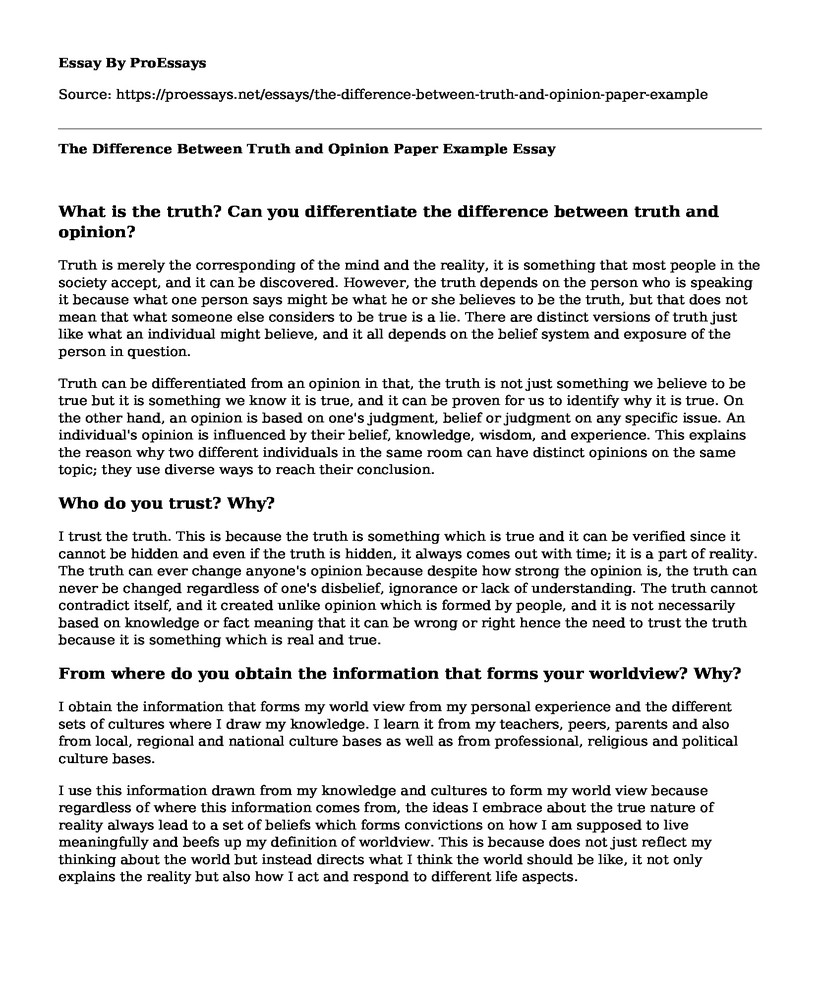What is the truth? Can you differentiate the difference between truth and opinion?
Truth is merely the corresponding of the mind and the reality, it is something that most people in the society accept, and it can be discovered. However, the truth depends on the person who is speaking it because what one person says might be what he or she believes to be the truth, but that does not mean that what someone else considers to be true is a lie. There are distinct versions of truth just like what an individual might believe, and it all depends on the belief system and exposure of the person in question.
Truth can be differentiated from an opinion in that, the truth is not just something we believe to be true but it is something we know it is true, and it can be proven for us to identify why it is true. On the other hand, an opinion is based on one's judgment, belief or judgment on any specific issue. An individual's opinion is influenced by their belief, knowledge, wisdom, and experience. This explains the reason why two different individuals in the same room can have distinct opinions on the same topic; they use diverse ways to reach their conclusion.
Who do you trust? Why?
I trust the truth. This is because the truth is something which is true and it can be verified since it cannot be hidden and even if the truth is hidden, it always comes out with time; it is a part of reality. The truth can ever change anyone's opinion because despite how strong the opinion is, the truth can never be changed regardless of one's disbelief, ignorance or lack of understanding. The truth cannot contradict itself, and it created unlike opinion which is formed by people, and it is not necessarily based on knowledge or fact meaning that it can be wrong or right hence the need to trust the truth because it is something which is real and true.
From where do you obtain the information that forms your worldview? Why?
I obtain the information that forms my world view from my personal experience and the different sets of cultures where I draw my knowledge. I learn it from my teachers, peers, parents and also from local, regional and national culture bases as well as from professional, religious and political culture bases.
I use this information drawn from my knowledge and cultures to form my world view because regardless of where this information comes from, the ideas I embrace about the true nature of reality always lead to a set of beliefs which forms convictions on how I am supposed to live meaningfully and beefs up my definition of worldview. This is because does not just reflect my thinking about the world but instead directs what I think the world should be like, it not only explains the reality but also how I act and respond to different life aspects.
Which barriers are the most prevalent in your critical thinking process, and which ones do you experience most prevalent in others?
The barriers most prevalent to my critical thinking are; first the Ego Defense: It is the psychological coping mechanism that helps me distort the reality to protect myself guilt, anxiety and any other bad feeling. Refusing to accept that I have some faults is one of my barriers to critical thinking because I deny what I do not want to feel or admit making me became closed minded. Secondly, emotional experiences: I'm a very passionate and emotional person. Sometimes I suffer from anger and depression issues especially when I fail to achieve my goals. These emotions cloud my head distorting the reality and influencing my thoughts without me knowing it. Thirdly, expectations and schemata: This refers to the way individuals think and perceive others and situations based on ideas formed about them. It affects my thinking towards groups.
The barriers I think are most prevalent to others include; Prejudice: Most individuals believe that their opinions are always right; hence they make decisions based on their views instead of using the information provided. Secondly, Enculturation: It has different influences on individuals preferences and choices. This becomes a barrier to many people because it shapes their worldview, prejudices, and stereotypes.
Cite this page
The Difference Between Truth and Opinion Paper Example. (2022, Nov 28). Retrieved from https://proessays.net/essays/the-difference-between-truth-and-opinion-paper-example
If you are the original author of this essay and no longer wish to have it published on the ProEssays website, please click below to request its removal:
- Critical Viewpoints Essay Example
- Essay on Student Affairs: Broadening Functional Areas for Student Success
- Essay Sample on Exploring Autism at a Preschool Setting
- Essay Sample on Children and Prejudice: A Study of Early Development
- Essay Sample on Developmentally Appropriate Practice: Enhancing Early Childhood Learning
- Essay Sample on Personal SWOT Analysis: A Tool for Success
- Essay Example on Creating Positive Educ. Culture: Involving All Stakeholders







